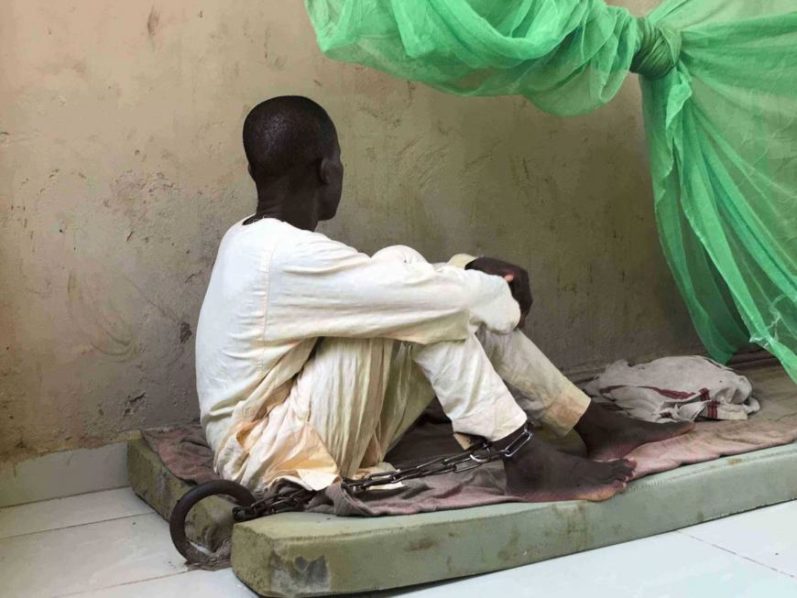
A human rights report has exposed how mentally ill persons in Nigeria are subjected to inhuman treatments in both state-run and private facilities across the country.
The report by Human Rights Watch said a few hundred people were arbitrarily detained, and where people were regularly chained or shackled in 28 state-run and private facilities the rights organisation visited between 2018 and 2019.
“In Nigeria people with mental health conditions were held in iron shackles around their ankles in locked-up wards in a psychiatric hospital and in government-run rehabilitation centers,” the report said.
[ad]
“Amongst the people Human Rights Watch interviewed, the youngest child chained was a 10-year-old boy and the oldest person was an 86-year-old man,” the reported added.
“I go to the toilet in nylon bags, until they take it away at night. I last took a bath days ago. I eat here once a day. I am not free to walk about. At night I sleep inside the house. I stay in a different place from the men. I hate the shackles. I want to move about, I have asked the baba [faith healer] to take them off, but he won’t,” Mudinat, a woman with a psychosocial disability chained at a church, Abeokuta in September 2019 told Human Rights Watch.
But Nigeria is not the only country fingered in the report.
The report said the inhuman treatments were observed in about 60 countries across Asia, Africa, Europe, the Middle East, and the Americas.
The 56-page report, “Living in Chains: Shackling of People with Psychosocial Disabilities Worldwide,” examines how people with mental health conditions are often shackled by families in their own homes or in overcrowded and unsanitary institutions, against their will, due to widespread stigma and a lack of mental health services.
[ad]
“In Nigeria, boys as young as 10 were chained together in rooms with adult men, leaving them at risk of abuse,” the report stated.
It said many countries, including Nigeria, believe that psychosocial disabilities are the result of possession by evil spirits or witchcraft.
“We have to use chains in some cases,” a doctor working at a psychiatric hospital in southern Nigeria told Human Rights Watch.
Apart from been chained Human Rights Watch exposed that the patients are also being beaten.
[ad]
“They always beat me up, at times they assigned my own children to beat me up, for instance, this one who takes care of my drugs bill,” Halima, a woman with a psychosocial disability, Kano told the rights organisation in September 2019.
Also, people in Islamic rehabilitation centers told Human Rights Watch that staff whipped them.
In one center in northern Nigeria, Human Rights Watch found a dozen people who showed researchers scars on their arms, chests, and backs that they said were from floggings by staff.
Amina, who had a breakdown after her mother died and was taken to various Islamic healers, said she was tied with ropes, beaten, and spat on in one rehabilitation center in Kaduna, and then molested by a traditional healer in Abuja who came to her home: “He told me to undress, that it is the part of the healing process, and then he started touching my body,” Amina said. “Explain to me, how is that part of a healing process? How is that Islamic?”
[ad]
The report said as of 2019, while the average monthly earning was roughly 18,000 Naira, a traditional healer would charge anywhere between 2,000 to 150,000 Naira for spiritual treatment.
Human Rights Watch said in the healing centers visited there is no formal admission or discharge process. In traditional or religious healing centers, there is no medical diagnosis and the basis for admission and discharge is left entirely to the discretion of the faith or religious healer.
If the family does not come to pick up the relative or abandons them at the institution, the person can end up spending many years or even the rest of their life shackled in the social care institution or healing center. In some cases, families left fake phone numbers and addresses in order to abandon the relative, while in other cases they simply moved homes or failed to show up.
[ad]
Human Right Watch said National governments should act urgently to ban shackling, reduce stigma, and develop quality, accessible, and affordable community mental health services.
Governments should immediately order inspections and regular monitoring of state-run and private institutions and take appropriate action against abusive facilities, Human Rights Watch said.
“It’s horrifying that hundreds of thousands of people around the world are living in chains, isolated, abused, and alone,” Kriti Sharma, senior disability rights researcher at Human Rights Watch and author of the report said.
“Governments should stop brushing this problem under the rug and take real action now.”
[ad]



